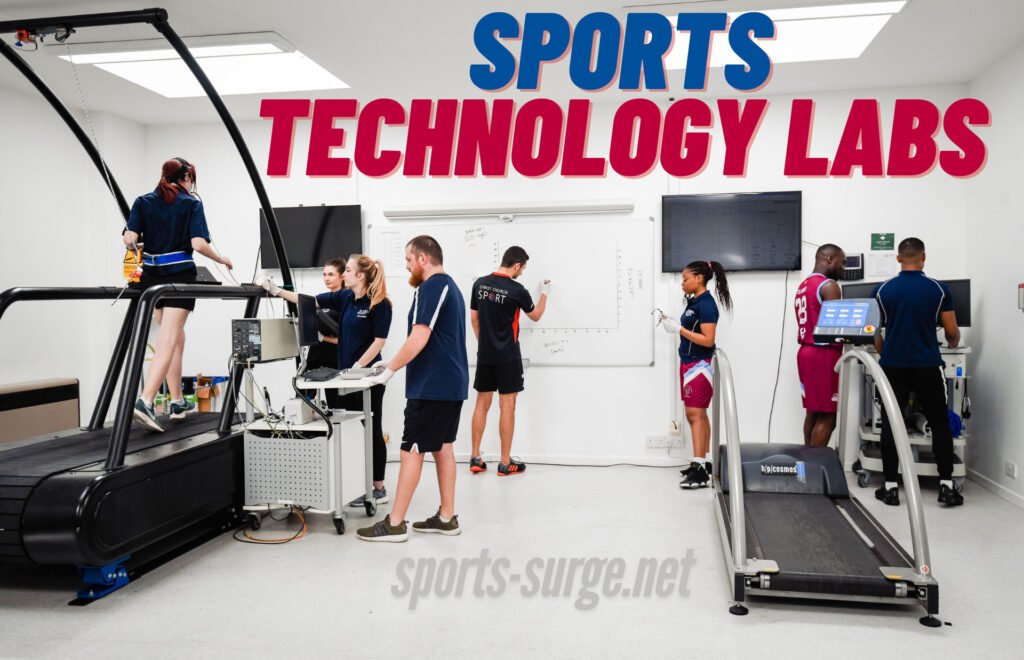In the rapidly evolving world of sports, technology plays a pivotal role in enhancing athletic performance, ensuring fair play, and elevating fan engagement. At the heart of these advancements are sports technology labs—dedicated research and development centers that drive innovation across various sports disciplines. This article delves into the significance of Sports Technology Labs, highlighting notable examples and their contributions to the sports industry as of 2024.
Table of Contents
ToggleThe Role of Sports Technology Labs

Sports technology labs serve as the nexus between athletic performance and technological innovation. They focus on several key areas:
- Performance Enhancement: Developing equipment and training methodologies that boost athletes’ capabilities.
- Injury Prevention and Rehabilitation: Creating tools and protocols to minimize injuries and expedite recovery.
- Data Analytics: Utilizing data to inform strategies, training, and game-day decisions.
- Fan Engagement: Innovating ways to enrich the spectator experience through technology.
Notable Sports Technology Labs and Their Contributions

Nike Sport Research Lab (NSRL)
-
- Overview: Established in 1980, the NSRL is located in Beaverton, Oregon, and is integral to Nike’s product innovation.
- Contributions: The lab has pioneered advancements in athletic footwear and apparel, employing high-speed cameras, motion capture systems, and environmental chambers to test products under various conditions. For instance, leading up to the 2024 Paris Olympics, the NSRL developed the Pegasus Premium running shoe, designed to enhance performance in diverse climates.
Milan Lab
-
- Overview: Founded in 2002, Milan Lab is the scientific research center for the Italian football club AC Milan.
- Contributions: The lab focuses on player health and performance, utilizing data analytics to monitor physical conditions and prevent injuries. This approach has been credited with extending the careers of several players by optimizing training loads and recovery protocols.
Playermaker
-
- Overview: An Israeli sports technology company established in 2017, Playermaker specializes in wearable devices that track and analyze player performance.
- Contributions: Their sensors attach to footwear, providing data on metrics like gait, balance, and ball interaction. In 2023, Playermaker received FIFA certification, allowing its devices to be used in official match play, marking a significant advancement in performance tracking.
Infinite Athlete
-
- Overview: Formed in 2023 from the merger of Biocore and Tempus Ex Machina, Infinite Athlete is a U.S.-based sports data technology corporation.
- Contributions: The company offers integrated player tracking and data visualization technologies. Notably, it has partnered with organizations like the NFL and Chelsea FC to provide real-time data monitoring, enhancing both performance analysis and fan engagement.
Recent Innovations in Sports Technology Labs

- Spray-On Running Shoes: Swiss sportswear brand On introduced the Cloudboom Strike LS, a spray-on running shoe utilizing LightSpray technology. This innovation reduces material usage and manufacturing time, exemplifying sustainable practices in sports equipment production.
- AI Umpiring Systems: The Australian Open explored the use of AI for umpiring foot faults, employing skeletal tracking technology to monitor player movements. This system aims to enhance the accuracy and speed of officiating, reflecting a broader trend of integrating AI into sports.
Impact on the Sports Industry
The advancements emerging from sports technology labs have far-reaching implications:
- Enhanced Athletic Performance: Innovative training tools and equipment enable athletes to achieve new performance levels.
- Improved Safety: Data-driven insights contribute to better injury prevention strategies, promoting athlete longevity.
- Elevated Fan Experience: Technological integrations offer fans immersive and interactive ways to engage with sports.
- Data-Driven Decision Making: Teams and coaches leverage analytics for strategic planning and in-game adjustments.
Conclusion
As of 2024, sports technology labs continue to be instrumental in shaping the future of sports. Through relentless innovation and application of cutting-edge technologies, they enhance athletic performance, ensure fair play, and enrich the overall sports experience for participants and fans alike. The ongoing collaboration between scientists, engineers, and athletes within these labs promises a dynamic and exciting evolution in the sports industry.
FAQs about Sports Technology Labs
What are sports technology labs?
Sports technology labs are specialized research facilities dedicated to developing and applying technological innovations in sports. They focus on areas such as performance enhancement, injury prevention, data analytics, and improving the overall sports experience for athletes and fans.
How do sports technology labs enhance athletic performance?
These labs utilize advanced equipment and methodologies, including motion capture systems, wearable sensors, and data analytics, to analyze and improve athletes’ techniques, biomechanics, and training regimens. For instance, the Nike Sport Research Lab employs high-speed cameras and environmental chambers to test and refine athletic footwear and apparel.
What role do sports technology labs play in injury prevention and rehabilitation?
By analyzing movement patterns and physical stress, these labs develop strategies and equipment to reduce injury risks. They also create rehabilitation protocols to expedite recovery. For example, Milan Lab focuses on monitoring players’ physical conditions to prevent injuries and extend their careers.
How do sports technology labs contribute to fan engagement?
They develop technologies that enhance the spectator experience, such as virtual reality platforms, interactive applications, and real-time data visualization. For example, Sportian (formerly LaLiga Tech) offers digital tools that improve fan interaction and content delivery in sports and entertainment.
What are some notable sports technology labs and their recent innovations?
The Nike Sport Research Lab has developed the Pegasus Premium running shoe, designed for optimal performance in various climates. Playermaker introduced wearable devices that track and analyze player performance, receiving FIFA certification in 2023. Additionally, Swiss brand On unveiled the Cloudboom Strike LS, a spray-on running shoe utilizing LightSpray technology.
How do sports technology labs impact the sports industry?
They drive innovation across multiple facets of sports, leading to enhanced athletic performance, improved safety measures, data-driven decision-making, and enriched fan experiences. Their contributions are integral to the ongoing evolution and modernization of the sports industry.

